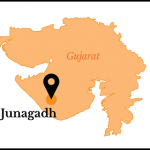Two weeks ago, Pakistan issued a map which, amongst other things, re-stated its claim to Junagadh, the former princely state on the Kathiawar Peninsula which is now part of the modern Gujarat, where India’s Prime Minister Narendra Modi used to be Chief Minister.
That Pakistan claims all of Kashmir (apart from those areas which China now occupies) is no more surprising than the fact that India also claims the whole area (including the Chinese parts). But Pakistan’s continued contention for the Indian territory of Junagadh is puzzling.
The reason can only be the understandable frustration at the heart of Pakistan’s recent diplomacy; that the big powers and the Islamic world have failed to respond to India’s unilateral action in revoking Article 370 and incorporating Ladakh and Kashmir under New Delhi’s federal control.
However, the continuing claim to Junagadh is damaging to Pakistan’s cause for three main reasons;
Firstly, it seems vexatious to the outside world (and the United Nations) and therefore detracts from any seriousness of Pakistan’s wider case over Kashmir. Continuing to profess ownership of Junagadh has no diplomatic value. It cannot be leveraged for concessions elsewhere. It has no public-relations worth because the underlying issue is too complicated and historical.
Secondly, the whole basis for the claim, that a princely ruler can decide the future of his or her whole population without a vote, is antiquated and damaging to Pakistan’s case for Jammu and Kashmir whose ruler chose India without a vote in October 1947.
And thirdly, if the Subcontinent were to become a theatre for a new Cold War between India and China, there could be unintended consequences. Pakistan’s suggestion that contiguity can exist due to coastal proximity could (in theory) be used by India to make equally spurious claims, for example, to the former states of Las Bela and Makran on the Balochistan coast.
Inevitably, history is important in understanding both the claim and why it is now redundant.
With Lord Mountbatten’s accelerated timetable for British departure in 1947, a large number of vital decisions were compressed into a few months. One of these was the famous dividing line in the Punjab drawn by Sir Cyril Radcliffe. Another was the right given to some 550 princely states of India to choose between India and Pakistan. In reality this was only a serious decision for a handful of princes because of the principle of contiguity.
The Nawab of Junagadh was a Muslim with a majority Hindu population. So this was a mirror-image of Kashmir with its Hindu ruler and Muslim majority. In all probability he would have copied the Nawab of Bhopal and acceded to India but his Dewan (Chief Minister) was Sir Shah Nawaz Bhutto, the father of Zulfiqar and grandfather of Benazir. Bhutto was a friend of Jinnah and both men saw an opportunity to use Junagadh as a bargaining chip.
They undoubtedly thought the accession of Junagadh might enable the accession of Hyderabad but this ambition was never realistic. But they also employed the tendentious argument that Junagadh was contiguous with Pakistan because of its sea-coast and its proximity to Karachi. The Nawab was persuaded to accede to Pakistan. India promptly rejected Bhutto’s move, the Nawab fled to Karachi and India gradually took control of the territory, following up with a plebiscite in February 1948 in which the population voted overwhelmingly to join India.
By conceding the plebiscite, India played into Jinnah’s hands. He immediately argued that, if a plebiscite was appropriate for Junagadh, then one should also be held in Kashmir with its Muslim majority. This contention remained at the centre of United Nations discussions about Kashmir until India’s victory in the 1971 war and the bilateral agreement between Zulfiqar Bhutto and Mrs Gandhi at Simla in 1972. At Simla the two leaders agreed “to settle their differences by peaceful means through bilateral negotiations or by any other peaceful means mutually agreed upon between them.” That peace has yet to be achieved.
Tim Willasey-Wilsey is Visiting Professor of War Studies at King’s College, London and a former senior British diplomat.
This article was exclusively written for Gateway House: Indian Council on Global Relations. You can read more exclusive content here.
For interview requests with the author, or for permission to republish, please contact outreach@gatewayhouse.in
© Copyright 2020 Gateway House: Indian Council on Global Relations. All rights reserved. Any unauthorized copying or reproduction is strictly prohibited.


